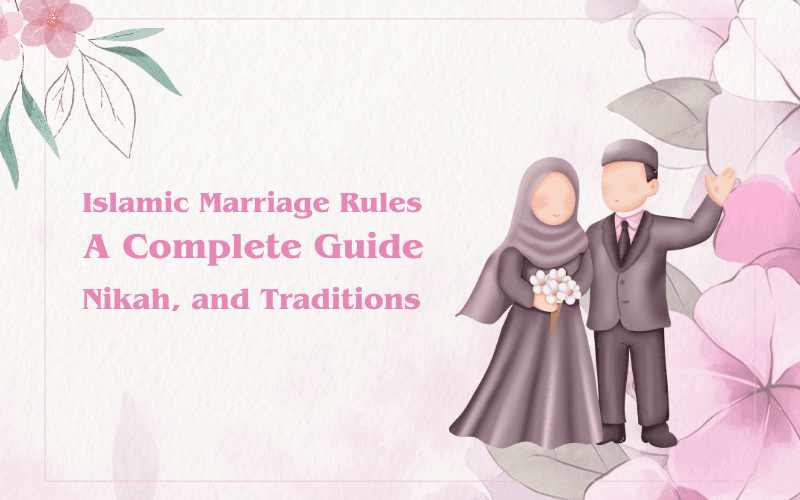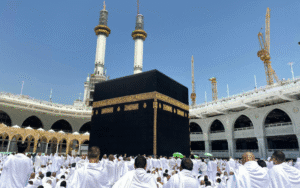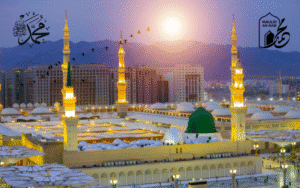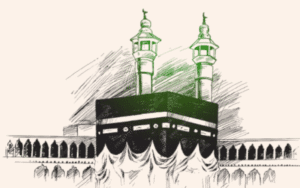Muslim Marriage Rules: A Complete Guide to Nikah, and Traditions

The Almighty Allah, in His infinite wisdom, created humanity and provided for all our needs, outlining a clear path to fulfill them. Alongside basic necessities like food, clothing, shelter, education, and health, our biological and emotional needs are also profoundly important. To meet these needs in a pure and dignified manner, Islam instituted the beautiful and orderly system of marriage (Nikah). Through marriage, a man and a woman can lead a life of honor and tranquility, forming a family that becomes the cornerstone of a stable society. This comprehensive islamic marriage guide will explore the importance of marriage, its correct procedures, and the responsibilities that follow, detailing the essential muslim marriage rules for every Muslim in today’s world.
Part 1: The Importance and Significance of Marriage in Islam
In Islam, marriage is not merely a means to satisfy physical desires; instead, it is a profound act of worship, a Sunnah (tradition) of the prophets, and a path to spiritual growth.
1. A Unique Sign of Allah’s Creation
The Almighty Allah created everything in this universe in pairs. He says in the Quran:
وَمِنْ كُلِّ شَيْءٍ خَلَقْنَا زَوْجَيْنِ لَعَلَّكُمْ تَذَكَّرُونَ
“And of all things We created two mates; perhaps you will remember.”
(Surah Adh-Dhariyat, 51:49)
Humans are no exception; Allah created all human beings to complement each other. Consequently, through marriage, He establishes a bond of tranquility, love, and mercy between them. In fact, He says:
وَمِنْ آيَاتِهِ أَنْ خَلَقَ لَكُمْ مِنْ أَنْفُسِكُمْ أَزْوَاجًا لِتَسْكُنُوا إِلَيْهَا وَجَعَلَ بَيْنَكُمْ مَوَدَّةً وَرَحْمَةً ۚ إِنَّ فِي ذَٰلِكَ لَآيَاتٍ لِقَوْمٍ يَتَفَكَّرُونَ
“And of His signs is that He created for you from yourselves mates that you may find tranquility in them; and He placed between you affection and mercy. Indeed in that are signs for a people who give thought.”
(Surah Ar-Rum, 30:21)
2. Moral Purity and Character Protection
Marriage actively helps individuals lower their gaze and guard their chastity, which in turn paves the way to Paradise. The Prophet Muhammad (peace be upon him) advised the youth, saying:
“O young people! Whoever among you can afford it, should get married, for it helps in lowering the gaze and protecting one’s private parts…”
(Bukhari, Hadith 5066; Muslim, Hadith 1400)
3. The Sunnah of the Prophets and Completion of Faith
Marriage is a cherished tradition of all the prophets and messengers. As evidence, Allah says:
وَلَقَدْ أَرْسَلْنَا رُسُلًا مِنْ قَبْلِكَ وَجَعَلْنَا لَهُمْ أَزْوَاجًا وَذُرِّيَّةً ۚ وَمَا كَانَ لِرَسُولٍ أَنْ يَأْتِيَ بِآيَةٍ إِلَّا بِإِذْنِ اللَّهِ ۗ لِكُلِّ أَجَلٍ كِتَابٌ
“And We have already sent messengers before you and assigned to them wives and descendants.”
(Surah Ar-Ra’d, 13:38)
Furthermore, many consider marriage a means of completing one’s faith. As the Prophet (ﷺ) said, “When a person gets married, he has fulfilled half of his religion.” (Al-Bayhaqi, Shu’ab al-Iman, Hadith 5487)
4. Preservation of Lineage and Social Stability
Marriage ensures the continuation of the human race and the formation of the family unit, which serves as the very foundation of society. Without a system of lawful marriage, lineage becomes lost, ultimately leading to chaos and social disintegration.
5. Financial Blessings and Allah’s Help
A person should not delay marriage out of fear of poverty because Allah has promised to provide for those who marry to maintain their chastity. Consequently, He says:
وَأَنْكِحُوا الْأَيَامَىٰ مِنْكُمْ وَالصَّالِحِينَ مِنْ عِبَادِكُمْ وَإِمَائِكُمْ ۚ إِنْ يَكُونُوا فُقَرَاءَ يُغْنِهِمُ اللَّهُ مِنْ فَضْلِهِ ۗ وَاللَّهُ وَاسِعٌ عَلِيمٌ
“If they are poor, Allah will enrich them from His bounty.”
(Surah An-Nur, 24:32)
6. Mental and Physical Well-being
Islam does not permit celibacy or monasticism. Therefore, a timely marriage is incredibly beneficial for both physical and mental health, helping to protect individuals from depression, anxiety, and other ailments.
Part 2: Key Muslim Marriage Rules: Rulings, Conditions, and Pillars
The ruling on marriage in Islam varies based on an individual’s unique circumstances.
- Wajib (Obligatory): Marriage becomes obligatory for a person who has the financial and physical means and fears falling into sin (like fornication) if they remain unmarried.
- Mustahabb (Recommended): For someone who has the means but also has enough self-control to avoid sin, marriage is highly recommended and better than remaining single.
- Haram (Forbidden): It is forbidden for a person to marry if they lack the means to support a wife and fulfill her rights, or if they are certain they cannot be just between multiple wives.
Conditions and Pillars for a Valid Nikah
For a marriage to be valid in Islam, the couple must meet several conditions and pillars. Fulfilling these conditions is fundamental to all muslim marriage rules.
- Identification of the Spouses: Both the bride and groom must be clearly identified and Islamically permissible for each other to marry.
- Full and Free Consent: Islam completely invalidates forced marriage. Therefore, both the man and the woman must give their willing consent.
- The Guardian (Wali): The presence and consent of the bride’s guardian (such as a father, grandfather, or brother) is a necessary condition for the marriage’s validity.
- Two Witnesses (Shahidain): At least two upright, adult Muslim men must witness the marriage contract.
- The Offer and Acceptance (Ijab and Qubul): This is the core pillar of the marriage. Specifically, the bride’s guardian makes the offer of marriage, and the groom publicly accepts it.
Part 3: The Nikah Ceremony Steps: A Step-by-Step Guide
Step 1: Choosing a Spouse and Seeing Each Other
When choosing a spouse, a person should prioritize their religious commitment and character above beauty, wealth, or lineage. Moreover, Islam permits the man and woman to see each other before marriage in the presence of a mahram (a non-marriageable relative) to help foster initial attraction and understanding.
Step 2: Determining the Mahr (The Obligatory Bridal Gift)
The Mahr is an obligatory gift from the groom to the bride; it is a Fard (obligation). Allah says:
وَآتُوا النِّسَاءَ صَدُقَاتِهِنَّ نِحْلَةً ۚ فَإِنْ طِبْنَ لَكُمْ عَنْ شَيْءٍ مِنْهُ نَفْسًا فَكُلُوهُ هَنِيئًا مَرِيئًا
“And give the women [upon marriage] their bridal gifts graciously.”
(Surah An-Nisa, 4:4)
The Mahr is an essential part of the muslim marriage rules, symbolizing the husband’s honor and commitment. The amount should be based on the husband’s financial ability, as Islam discourages exaggeration. The Prophet (ﷺ) said,
“The best Mahr is the easiest (to pay).”
(Al-Hakim, Al-Mustadrak, Hadith 2692).
The couple should arrange for its payment as soon as possible. If deferred, it remains a debt upon the husband that he must pay.
Step 3: The Nikah Ceremony (Aqd)
It is Sunnah to begin the ceremony with the Khutbat-ul-Hajah (The Sermon of Need), which includes praises of Allah and key Quranic verses. Following the sermon, the bride’s guardian, in the presence of witnesses, will offer his daughter/ward in marriage for the agreed-upon Mahr. The groom will then clearly state his acceptance. After the contract is complete, all those present should make this dua for the couple:
“May Allah bless you, and shower His blessings upon you, and join you together in goodness.”
(Tirmidhi, Hadith 1091)
Step 4: Announcing the Marriage and the Walima
A marriage should not remain secret. The Prophet (ﷺ) said,
“Announce the marriage.”
(Ahmad, Musnad, Hadith 15488).
Following the marriage, it’s the groom’s responsibility to host a Walima (wedding feast) for relatives, friends, and those in need. The purpose is to express gratitude to Allah, not to show off.
Part 4: Post-Marriage Sunnahs and Duties
On the wedding night, the husband should gently place his hand on his wife’s forehead and recite a specific dua for her well-being. It is also a beautiful Sunnah for the married couple to pray two rak’at of voluntary prayer together. In addition, reciting the specific dua before marital relations protects the couple and their future children from Shaytan. The couple must also avoid forbidden acts, as intercourse during the wife’s menstrual period or via the anus is strictly forbidden (Haram).
Over time, various cultural traditions and sinful practices have complicated the simple and beautiful Islamic wedding. Therefore, it is crucial for Muslims to avoid them and distinguish them from authentic Muslim wedding traditions.
- Dowry: The practice where the bride’s family must give money or goods to the groom is strictly forbidden (Haram) and a form of oppression. In Islam, the groom gives the bride a Mahr.
- Exaggerated Mahr: Setting an excessively high Mahr to show off social status runs contrary to the spirit of Islam.
- “Gaye Holud” / Turmeric Ceremonies: Events where non-mahram individuals freely mix to apply turmeric paste, often accompanied by music, clearly violate Islamic principles of modesty (hijab).
- Music and Dancing: Modern wedding parties with loud, vulgar music, DJ setups, and dancing constitute a major sin.
- Extravagance and Wastefulness: Spending lavishly on expensive items is a form of wastefulness, which Allah has condemned. In fact, Allah says in the Quran:
إِنَّ الْمُبَذِّرِينَ كَانُوا إِخْوَانَ الشَّيَاطِينِ ۖ وَكَانَ الشَّيْطَانُ لِرَبِّهِ كَفُورًا
“Indeed, the squanderers were brothers of the devils, and ever has Satan been to his Lord ungrateful.”
(Surah Bani-israil, 17:27)
- Un-Islamic Rituals: Many Muslims have adopted cultural rituals from other religions, such as exchanging rings or specific forms of bowing to elders (kadam busi), which have no place in Islam.
- Immodest Attire and Gatherings: Individuals attending weddings in revealing clothing without proper hijab, and people freely intermingling, are strictly prohibited.
Conclusion
Marriage is a sacred social contract and a profound act of worship that Islamic law ordains. It holds immense worldly and otherworldly benefits. However, a couple can only achieve this peace and blessing when they conduct the marriage with sincerity and in accordance with the simple path the Shariah lays out. By avoiding cultural superstitions, wastefulness, and forbidden acts, we can revive the true spirit of the Sunnah in our marriages, uphold the correct muslim marriage rules, and invite the peace and mercy of Allah into our families and society. May Allah grant us all the correct understanding. Ameen.
Frequently Asked Questions
What is the purpose of marriage (Nikah) in Islam?
Marriage in Islam is not just for fulfilling physical desires. It is considered a sacred act of worship, a Sunnah (tradition) of the prophets, and a path to spiritual growth. It provides a way for a man and a woman to live a life of honor and tranquility, form a family, and protect their chastity.
What are the essential conditions for a Muslim marriage to be valid?
For a marriage to be valid in Islam, several key conditions and pillars must be met:
- Full and free consent from both the bride and groom.
- The presence and consent of the bride's guardian (Wali).
- The presence of at least two upright, adult Muslim witnesses (Shahidain).
- A clear offer and acceptance (Ijab and Qubul) of the marriage contract.
What is Mahr and is it obligatory in a Muslim marriage?
Mahr is an obligatory bridal gift from the groom to the bride. It is a fundamental part of the Muslim marriage rules and symbolizes the husband’s honor and commitment to his wife. The amount should be reasonable, based on the husband's financial ability, and should not be exaggerated.
What Islamic practices are discouraged or forbidden during a wedding?
The article highlights several forbidden (haram) practices that have become common in some cultures:
- Dowry, where the bride's family gives money to the groom.
- Excessive extravagance and wastefulness in celebrations.
- Mixed-gender gatherings with free intermingling, music, and dancing.
- Un-Islamic rituals like exchanging rings, which have no basis in Islamic tradition.









